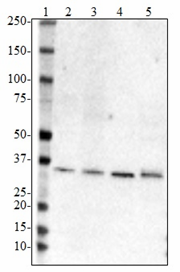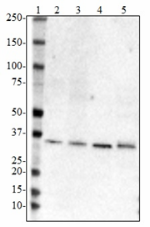- Clone
- A17067B (See other available formats)
- Regulatory Status
- RUO
- Other Names
- Apolipoprotein E, Alzheimer Disease 2, LDLCQ5, LPG, AD2
- Isotype
- Mouse IgG2b, κ
- Ave. Rating
- Submit a Review
- Product Citations
- publications

-

Western blot of purified anti-APO E, 109-116 antibody (clone A17067B). Lane 1: Molecular weight marker; Lane2: 50 ng of recombinant human Apo E2; Lane 3: 50 ng of recombinant human Apo E3; Lane 4: 50 ng of recombinant human Apo E4; Lane 5: 16 µg of human plasma. The blot was incubated with 0.2 µg/mL of the primary antibody overnight at 4°C, followed by incubation with HRP-labeled goat anti-mouse IgG (Cat. No. 405306). Enhanced chemiluminescence (Cat. No. 426302) was used as the detection system. -

Direct ELISA of purified anti-APO E, 109-116 antibody (clone A17067B) binding to plate-immobilized recombinant human APO E2, APO E3, and APO E4. ELISA was performed by coating wells with 100 ng of APO E proteins. The wells were then incubated with the primary antibody at 37°C for 45 minutes, followed by incubation with horseradish peroxidase labeled goat anti-mouse secondary antibody. TMB (3, 3', 5, 5' tetramethylbenzidine, Cat. No. 421501) was used as the detection system.
| Cat # | Size | Price | Quantity Check Availability | Save | ||
|---|---|---|---|---|---|---|
| 852701 | 25 µg | $112 | ||||
| 852702 | 100 µg | $276 | ||||
Apolipoprotein E (Apo E) belongs to a class of apolipoproteins that mediate the binding, internalization, and catabolism of lipoprotein particles. Apo E is produced by the liver and macrophages in peripheral tissues where it regulates cholesterol metabolism. In the central nervous system, Apo E is primarily produced by astrocytes and plays an important role in transporting cholesterol to neurons via Apo E receptors. Apo E has three alleles (ApoE2, ApoE3 and ApoE4) that differ from each other by only one or two amino acids at positions 112 and 158. ApoE 4 is one of the largest known genetic risk factors for late-onset Alzheimer's disease. Furthermore, Apo E is associated with cardiovascular disease, Lipoprotein Glomerulopathy and Sea-Blue Histiocyte Disease.
Product DetailsProduct Details
- Verified Reactivity
- Human
- Antibody Type
- Monoclonal
- Host Species
- Mouse
- Formulation
- Phosphate-buffered solution, pH 7.2, containing 0.09% sodium azide.
- Preparation
- The antibody was purified by affinity chromatography.
- Concentration
- 0.5 mg/ml
- Storage & Handling
- The antibody solution should be stored undiluted between 2°C and 8°C.
- Application
-
WB - Quality tested
Direct ELISA - Verified - Recommended Usage
-
Each lot of this antibody is quality control tested by Western blotting. For Western blotting, the suggested use of this reagent is 0.2 - 1.0 µg per ml. For Direct ELISA applications, a concentration range of 0.004 - 0.4 µg/mL is recommended. It is recommended that the reagent be titrated for optimal performance for each application.
-
Application References
(PubMed link indicates BioLegend citation) -
- Mahley RW. 2016. Arterioscler Thromb Vasc Biol. 36: 1305-1315.
- Riedel BC, et al. 2016. J Steroid Biochem Mol Biol. 160:134-47.
- Tai LM, et al. 2016. Acta Neuropathol. 131(5):709-23.
- Kim J, et al. 2014. Mol. Cells. 37:767
- Holtzman DM, et al. 2012. Cold Spring Harb. Perspect. Med. 2:a006312
- RRID
-
AB_2728597 (BioLegend Cat. No. 852701)
AB_2728597 (BioLegend Cat. No. 852702)
Antigen Details
- Structure
- Human APO E is a 299 amino acid protein with a molecular mass of 32 kD, and exists as 3 major isoforms, APO E2, APO E3, and APO E4.
- Distribution
-
Tissue sources: Ubiquitously expressed. Highest levels in liver, brain, spleen, adrenal gland, and kidney.
Cellular distribution: Plasma membrane, nucleus, endoplasmic reticulum, golgi apparatus, endosome, and extracellular.
- Function
- Apo E is involved in lipoprotein metabolism as well as the transport of fat-soluble vitamins, and cholesterol. Apo E also forms complexes with amyloid beta peptides leading to its uptake and degradation by microglia.
- Interaction
- Tau, amyloid beta
- Ligand/Receptor
- LDL receptor, SORL1
- Biology Area
- Cell Biology, Neurodegeneration, Neuroscience, Protein Misfolding and Aggregation
- Molecular Family
- Apolipoproteins
- Antigen References
-
- Mahley RW. 2016. Arterioscler Thromb Vasc Biol. 36: 1305-1315.
- Riedel BC, et al. 2016. J Steroid Biochem Mol Biol. 160:134-47.
- Tai LM, et al. 2016. Acta Neuropathol. 131(5):709-23.
- Kim J, et al. 2014. Mol. Cells. 37:767
- Holtzman DM, et al. 2012. Cold Spring Harb. Perspect. Med. 2:a006312
- Gene ID
- 348 View all products for this Gene ID
- UniProt
- View information about Apo E 109-116 on UniProt.org
Related Pages & Pathways
Pages
Related FAQs
Other Formats
View All Apo E, 109-116 Reagents Request Custom Conjugation| Description | Clone | Applications |
|---|---|---|
| Purified anti-Apo E, 109-116 | A17067B | WB,Direct ELISA |
Compare Data Across All Formats
This data display is provided for general comparisons between formats.
Your actual data may vary due to variations in samples, target cells, instruments and their settings, staining conditions, and other factors.
If you need assistance with selecting the best format contact our expert technical support team.
 Login/Register
Login/Register 









Follow Us